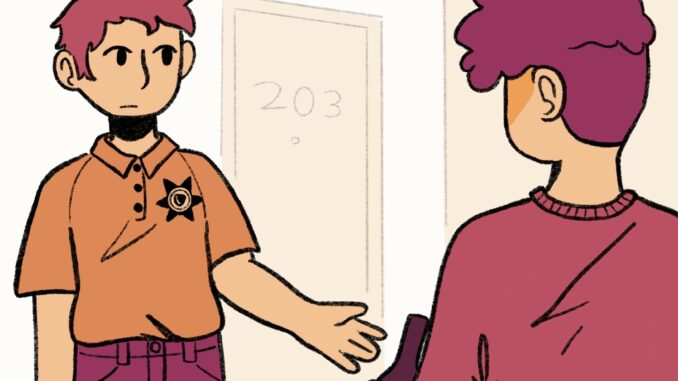
Campus Safety is often ridiculed for either being too strict or not doing enough. Whether you are having a conversation with them or they are ruthlessly confiscating the beer you had to wait an hour at the Pio stop for, at the end of the day, their job is to protect the student body. The Campus Safety team consists of 13 individuals, 11 of whom are Campus Safety officers.
Their motto is “It Takes a Village,” emphasizing the responsibility each LC student has to keep our school a healthy environment. I agree; to keep our community safe, each of us must make individual efforts. That said, the department itself holds a lot of the responsibility, which begs the question: What would a better Campus Safety look like?
Nobody likes a helicopter parent, which is why I think Campus Safety is doing a great job at “gentle parenting” us. Last Saturday, I witnessed an officer confiscating alcohol; the interaction did not last long — I would say a maximum of 20 seconds. A student walked out of their dorm and was met face-to-face with an officer. He simply just stuck out his hand, and with no words or argument, the student handed him the alcohol. He gave them a warning as he walked away, but no harshness was implemented. I believe this was the perfect interaction between a student violating campus policies and an officer enforcing those policies.
Along with the “gentle parenting” approach, the community has explored the idea of expanding the Campus Safety team to include public health and safety agents. I went to Assistant Professor with Term of Anthropology Kabir Heimsath and asked for his perspective on the current state of Campus Safety.
“Why are we hiring out of law enforcement? Shouldn’t we look to health and public safety officials?” said Heimsath.
Along with Campus Safety acting as law enforcement, they should open up a department to focus on the health of the LC community and address all forms of safety. While I agree with Heimsath, I understand this extension of Campus Safety calls for funding that LC may not be able to budget in the coming years. Sam LoCurto ’28 shares a similar view.
“Having access to public health officers promotes a safer, more relaxed campus environment as opposed to former law enforcement, which, at least to me, creates an atmosphere of animosity and uncertainty on our campus,” said LoCurto.
This branch would include Emergency Medical Technicians, social workers, nurses, mental health professionals and public health officers.
I was not able to interview any of the 13 members of the campus safety staff. I went into the Campus Safety office, where the staff declined to interview and told me that any interview had to be cleared with the Director of Campus Safety. The interim Director did not respond for comment.
Campus security could take the approach of being a power-hungry team that aims to put down the student body instead of uplifting students who need help, but they do not. I have had several positive interactions with Campus Safety officers while playing tag with friends, in which they complimented us on community building or provided friendly reminders about quiet hours.
Communication is the most significant contributing factor to engaging students in a safe environment. Campus safety needs to be clear and vocal with students to make sure the “village” continues to thrive. A safe campus environment can only be achieved with trust. That includes the relationship between students and officers, which is a two-way street; if students struggle or refuse to trust the campus safety team, the campus will not be as safe.

Leave a Reply